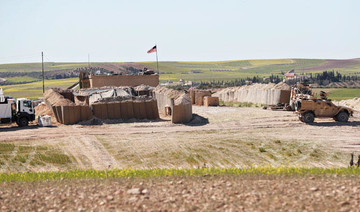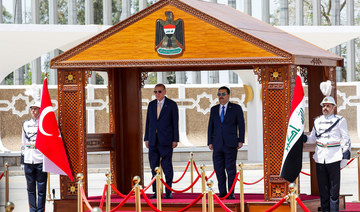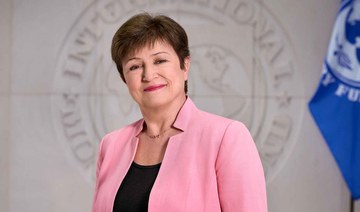ANKARA: Nine people were killed and nearly 50 injured after a high-speed train crashed into a locomotive in the Turkish capital on Thursday, officials said.
Transport Minister Cahit Turhan told reporters in televised remarks that three of those killed were operators of the train.
One of the victims died in hospital, he added.
Turhan added that 47 people were injured and were in hospital for treatment.
The fast train had been on its way from Ankara’s main station to the central province of Konya and according to Hurriyet daily, there were 206 passengers on board.
Earlier, the Ankara governor’s office said three out of a total of 46 people had been seriously injured.
The death toll was rising fast. Ankara governor Vasip Sahin said earlier on Thursday morning that four people had been killed.
“This morning there was an accident after the 6.30 high-speed train to Konya hit a locomotive tasked with checking rails on the same route,” Sahin told reporters in televised remarks.
Turhan said the accident took place six minutes after the train left Ankara as it entered the Marsandiz station.
The governor said search and rescue efforts continued as “technical investigations” were underway to find out exactly what caused the crash in Yenimahalle district.
He said information about the cause of the crash would be shared with the public when it is known.
Images published by Turkish media showed some wagons had derailed and debris from the train scattered on the rail track, which was covered in snow.
The windows of one wagon were completely broken while another wagon had been smashed after hitting the footbridge, which also collapsed, an AFP correspondent at the scene said.
The Ankara public prosecutor launched an investigation into the crash, state news agency Anadolu reported.
The Ankara to Konya high-speed route was launched in 2011 and was followed in 2014 with a high-speed link between Ankara and Istanbul.
The accident comes after another rail disaster in July this year when 24 people were killed and hundreds more injured after a train derailed in Tekirdag province, northwest Turkey, due to ground erosion following heavy rains.
Turkey’s rail network has been hit by several fatal accidents in recent years.
In March 2014, a commuter train smashed into a minibus on a railway track in the southern Turkish province of Mersin, which left 10 dead.
In January 2008, nine people were killed when a train derailed in the Kutahya region south of Istanbul because of faulty tracks.
Turkey’s worst rail disaster in recent history was in July 2004 when 41 people were killed and 80 injured after a high-speed train derailed in the northwestern province of Sakarya.
Ankara train crash leaves nine dead, 47 injured
Ankara train crash leaves nine dead, 47 injured
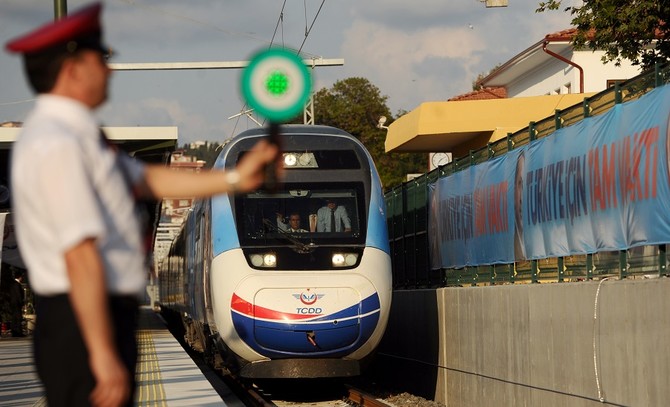
- 47 others were injured in the train crash, according to the Ankara governor
- The high-speed train crashed into a locomotive which carries out track inspections
Turkiye offers Iraq technical help to bolster border security
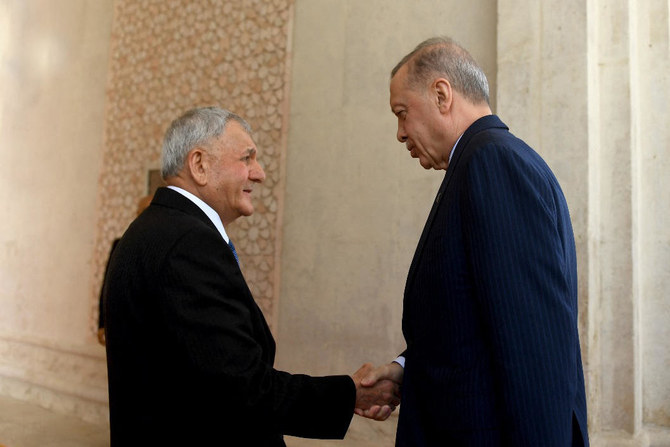
- A delegation from Iraq earlier visited Turkiye to examine the border security systems that Turkiye offered to provide
- Discussions for security cooperation still under way
ANKARA: Turkiye is in discussions with Iraq to provide technical assistance to Baghdad for securing its borders to prevent movements of outlawed Kurdistan Workers Party (PKK) militants around the region, a Turkish defense ministry official said on Thursday.
Turkish President Tayyip Erdogan visited Baghdad and Irbil this week as Ankara ramped up cross-border operations against PKK militants based in mountainous, mainly Kurdish northern Iraq.
The two countries agreed to a strategic framework agreement overseeing security, trade and energy as well as a defense cooperation deal during the visit.
“We told our counterparts that Turkiye is ready to provide assistance to Iraq on border security systems,” the Turkish official told reporters.
A delegation from Iraq earlier visited Turkiye to examine the border security systems that Turkiye offered to provide, the official also said, adding that the discussions for security cooperation were still under way.
During a joint press conference with Erdogan on Monday, Iraqi Prime Minister Mohammed Shia Al-Sudani said the two countries would cooperate to bolster border security, without mentioning the PKK specifically.
The PKK took up arms against the Turkish state in 1984 and is designated a terrorist organization by Ankara and its Western allies. Turkiye has conducted a series of cross-border operations against the group in northern Iraq since 2019.
PM, president vow to end malaria, leading cause of illness and death in Pakistan
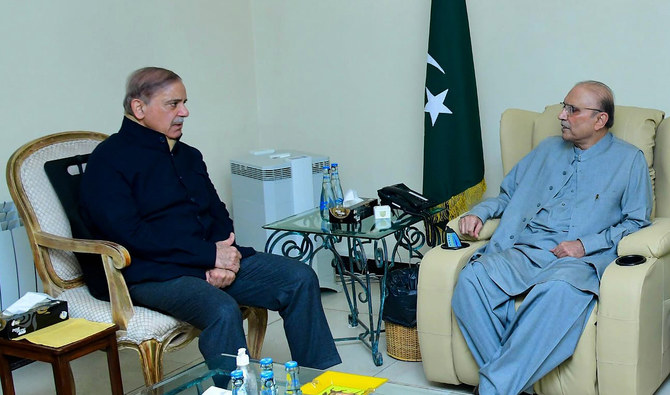
- Over 3.4 million suspected cases of malaria reported in Pakistan between Jan-Aug 2022
- Rapid upsurge observed in Balochistan and Sindh provinces after devastating floods in June 2022
ISLAMABAD: Pakistani top leaders on Thursday called on the government, international partners and organizations, health care professionals, and individuals to unite in their efforts to end malaria, one of the leading causes of illness and death in Pakistan according to the World Health Organization.
The Pakistani prime minister and president sent out the message on World Malaria Day, commemorated on April 25 each year to highlight the need for continued investment and sustained political commitment for malaria prevention and control. The day was instituted by WHO Member States during the World Health Assembly of 2007.
According to WHO data, from January through August 2022, more than 3.4 million suspected cases of malaria were reported in Pakistan compared with the 2.6 million suspected cases reported in 2021. Over 170 000 cases were laboratory confirmed.
A rapid upsurge in cases was observed in Balochistan and Sindh provinces after devastating floods in mid-June 2022, together accounting for 78 percent of all confirmed cases. The risk was assessed by the WHO as very high considering the effect of the flood crisis on the capacity of the national health system.
“In his message on the occasion of World Malaria Day, PM emphasized collaborative efforts to strengthen health care systems, increase access to quality diagnosis and treatment, and raise awareness about the importance of prevention and control measures of malaria,” state-run Radio Pakistan said, reporting on Prime Minister Shehbaz Sharif’s message.
The PM called on research and academic institutions “to flag scientific advances to both experts and the general public, international partners, companies and foundations to showcase their efforts and reflect on how to further scale up malaria control interventions.”
He said Pakistan had significantly enhanced free malaria testing and treatment facilities in malaria-endemic districts across the country through collaboration between the health ministry, national and international partners, provincial counterparts, NGOs and private stakeholders.
In a separate message, President Asif Ali Zardari emphasized collective efforts to curb malaria and expressed concerns over the rise in malaria cases due to the 2022 floods.
“Zardari called upon the provincial governments and other stakeholders to unite to deal with this alarming situation. He also called for raising awareness about the disease,” Radio Pakistan said.
Pakistan was hit by devastating floods in June 2022 which resulted in over 33 million people being affected, 81 districts being declared as calamity-hit and the national health infrastructure being badly impacted.
An upsurge in reported malaria cases was observed after the floods. In Sindh province, confirmed malaria cases in August 2022 reached 69,123 compared to 19,826 cases reported in August 2021. In Balochistan province, 41,368 confirmed cases were reported in August 2022 compared to 22,032 confirmed cases in August 2021. These two provinces together accounted for 78 percent of all reported confirmed cases in Pakistan in 2022.
Reports from 62 high-burden districts indicated that additional 210,715 cases were reported in September 2022, compared to 178,657 cases reported in the same districts in August 2022.
Saudi NHC, Spain’s Urbas to construct almost 600 housing units in Al-Fursan suburb
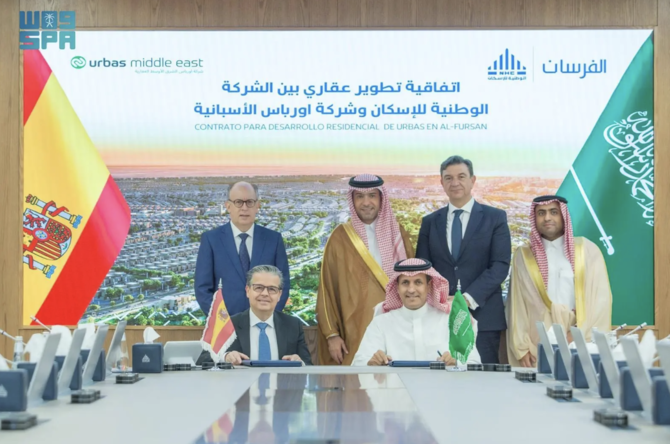
RIYADH: Saudi Arabia’s Al-Fursan suburb will soon be home to 589 new residential units worth around SR1 billion ($266 million) thanks to a deal sealed by the National Housing Co.
Inked with Urbas Middle East Real Estate Co., a subsidiary of the Spanish Urbas Group, the agreement involves the development as well as construction of the housing units on an area spanning 150,000 sq. m, the Saudi Press Agency reported.
This collaboration marks a significant milestone in the development of the Al-Fursan suburb. It also promises to set new standards in property development.
“This agreement complements the efforts of the recent visit to Spain and continues to attract international investments with major companies to provide various housing products that fulfill and meet the desires of citizens,” Saudi Minister of Municipal and Rural Affairs and Housing Majid Al-Hogail said in a post on X.
“As an extension of our journey in attracting the best international experiences and expertise in the real estate development industry, I was pleased to meet the CEO of the Spanish company Urbas, which is planned to be one of the companies developing the Al-Fursan neighborhood project in Riyadh,” Al-Hogail added.
The minister also highlighted how this step will contribute to providing innovative housing options and facilitate the exchange of experiences between Saudi and international developers.
IMF surcharges on borrowings exacerbate global inequities: report

BENGALURU: Countries, mostly middle and lower-income, have been burdened by surcharges on top of interest payments on their borrowings from the International Monetary Fund, widening global inequities, according to a report by US think tanks.
WHY IT’S IMPORTANT
Indebted member countries paid about $6.4 billion in surcharges between 2020-2023, the report from Boston University’s Global Development Policy Center and Columbia University’s Initiative for Policy Dialogue released on Tuesday showed.
And the number of countries paying these surcharges has more than doubled in the last four years.
The IMF is expected to charge an estimated $9.8 billion in surcharges in the next five years, according to an earlier report by the Center for Economic and Policy Research.
Critics of the policy argue that surcharges do not hasten repayment and instead punish countries already struggling with liquidity constraints, increase the risk of debt distress and divert scarce resources that could be used to boost the struggling economies.
BY THE NUMBERS
Countries such as Ukraine, Egypt, Argentina, Barbados and Pakistan pay the most in surcharges, the report showed, accounting for 90 percent of the IMF’s surcharge revenues.
These surcharges, levied on top of the fund’s increasingly steeper basic rate, are IMF’s single largest source of revenue, accounting for 50 percent of total revenue in 2023.
KEY QUOTES
“IMF surcharges are inherently pro-cyclical as they increase debt service payments when a borrowing country is most need of emergency financing," Global Development Policy Center’s Director Kevin Gallagher said.
“Increasing surcharges and global shocks are compounding the economic pressure on vulnerable countries.”
CONTEXT
Data published by the Institute of International Finance earlier this year showed global debt levels hit a record of $313 trillion in 2023, while the debt-to-GDP ratio — a reading indicating a country’s ability to pay back debts — across emerging economies also scaled fresh peaks.
IMF shareholders agreed last week on the importance of addressing challenges faced by low-income countries, Managing Director Kristalina Georgieva said on Friday.
China’s wealth fund joins with Bahrain’s Investcorp for $1bn Middle East investment

RIYADH: China’s growing interest in the Middle East continues as the country’s sovereign wealth fund partnered with Bahrain’s Investcorp to establish a $1 billion investment pot.
According to a press statement, Investcorp Golden Horizon fund will assist companies across Saudi Arabia, the wider Gulf Cooperation Council region and China.
The reserve will be anchored by reputable institutional and private investors from the GCC, as well as China Investment Corp.
The press statement revealed that target companies are expected to have high growth potential in sectors including consumer, health care, logistics and business services.
“During the past couple of years, we have built several bilateral funds with leading financial institutions to facilitate industrial cooperation between China and major economies in the world,” said Bin Qi, executive vice president and chief information officer at CIC.
He added: “Currently, we are working closely with Investcorp to build a similar bilateral fund to strengthen financial and industrial ties between China and GCC countries.”
This commitment from CIC comes when the GCC’s appeal to institutional investors is gathering pace, thanks to its stable regulatory environment and pro-business policies, driven by economic diversification efforts in the region and strategic privatization mandates.
“This commitment by CIC, one of the world’s largest sovereign wealth funds, is a testament to Investcorp’s unparalleled franchise in the GCC and reinforces the trust placed in the firm’s global platform and teams. We are looking forward to building on this relationship and growing our partnership in the future,” said Mohammed Al-Ardhi, executive chairman of Investcorp.
Co-CEO of Investcorp Hazem Ben-Gacem said the launch of the new fund will facilitate cross-border cooperation and investments between the GCC and China.
Trade and economic relationships between the Middle East and China have always been strong.
In 2023, China’s exports to Saudi Arabia and the UAE amounted to $42.86 billion and $55.68 billion respectively.
On the other hand, the Asian giant’s imports from Saudi Arabia totaled $64.36 billion in 2023.
In November, Saudi Arabia’s central bank, also known as SAMA, and the People’s Bank of China signed a local currency swap agreement worth $6.93 billion.
SAMA, in a statement, said that the three-year agreement “has been established in the context of financial cooperation between the Saudi Central Bank and the People’s Bank of China.”
The Asian country’s central bank said that the agreement will help strengthen financial cooperation between Saudi Arabia and China, promote the use of local currencies, and strengthen trade and investments between nations.



